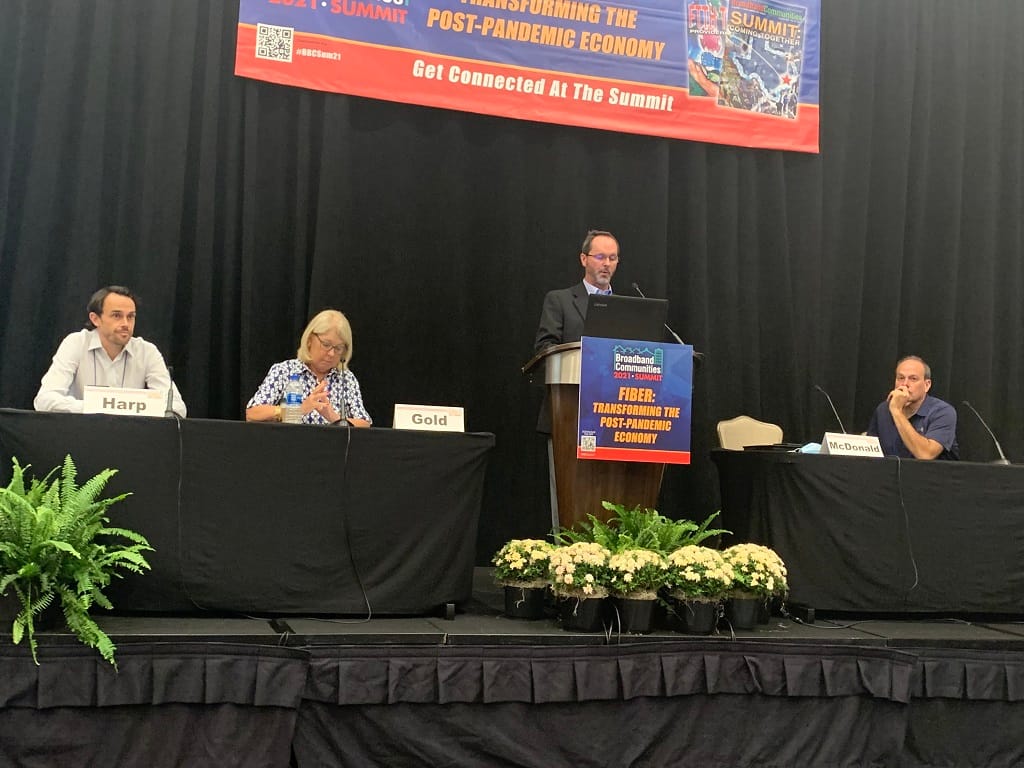Broadband Summit Hears How Partnerships Accelerate Infrastructure Rollout
The Broadband Communities Summit heard stories from coops, including the obstacles and keys to success.

HOUSTON, September 29, 2021 – During Broadband Communities Summit 2021, telecom experts gave advice on how to find and maintain successful partnerships in the industry.
Warren Rural Electric Cooperative Corporation is a member owned electric co-op operating out of South-Central Kentucky. Its President and CEO Dewayne McDonald spoke about his company’s experience partnering with telecom NCTC.
McDonald explained that as a co-op, WRECC did not have an option to not find a solution to a problem, regardless of its weaknesses. “Just because we could not do [something] ourselves [did not] mean we did not have to find a solution for our customers.” This drive to find solutions to their problems and support the communities they serve was the impetus for WRECC’s partnership with NCTC.
WRECC and NCTC complimented each other’s strengths and weaknesses – while NCTC had low name recognition, they offered great headend and customer premises services, and while WRECC struggled in those areas, they had superior name recognition in the region and experience with backbone and middle mile infrastructure.
Partnerships have allowed coops to expedite goals
By working together toward achieving common goals, WRECC/NCTC were able to set an aggressive timeline. While they currently serve over 2,000 customers, they are on course to pass 24,000 members in the next two to three years as they continue to expand into neighboring counties.
McDonald explained that the relationship between partners must be like a marriage. “There is give and take along the way,” he said. “Even though we are two separate entities, we want to be seen by [those we serve] as a single, united entity.” To achieve this, both organizations must represent a publicly united front toward the consumer by participating in joint, public announcements, town halls, websites, media coverage, and other efforts to reinforce the relationship between the partners.
Clint Harp is the vice president of the Lower Colorado River Authority. Historically, the organization has been responsible for operating and maintaining hydroelectric dams located along 800 miles of the Lower Colorado River.
Years ago, the LCRA began deploying broadband infrastructure along its existing electric infrastructure; entities that needed broadband and were located on or very near to LCRA infrastructure could benefit from these limited broadband build outs.
Though this was able to help many communities, the LCRA was not legally able to extend its broadband infrastructure beyond its own facilities to communities in need. However, on April 30, 2021, this changed when Texas Senate Bill 632 unanimously passed both houses and was signed into law by Gov. Greg Abbott. Thanks to this bill, LCRA was allowed to partner with ISPs throughout Texas. Though the LCRA was still forbidden from acting as a service provider, it was allowed to build out infrastructure off its previously existing assets and build out to communities in need.
By doing this, it removed some of the financial barriers of entry for carriers in areas that they may have otherwise struggled to get a return on their investment. These partnerships not only enabled more Texans to become connected to broadband, but it also allowed companies to expand their range of coverage.
Obstacles for cooperatives
Carl Meyerhoefer is the CEO of Conexon, a consulting engineering organization that entered flexible partnerships with broadband and electrical co-ops in the central U.S. According to Meyerhoefer, only around a quarter of Conexon’s clients follow through with a successful co-op after consulting with them. Based on this, he presented three key obstacles that prevent would-be co-ops from becoming successful.
Meyerhoefer stated that in most cases, a co-op will be unsuccessful for one of the following reasons: an inability to secure funding, a lack of experience, or an inability or refusal to “stick to your knitting.” Meyerhoefer stated that there are now ways to better navigate these pitfalls and overcome them.
He pointed to the historic level of broadband funding at both the state and federal level due to the Covid-19 pandemic; for those lacking the experience and know-how necessary to run a successful co-op, there are now consulting agencies (such as Conexon) that can assist organizations in need; to allow organizations to “stick to their knitting,” they now have partnership models they can take advantage of.
In Conexon’s case, they offer flexible models that allow organizations to stick to what they do best, ranging from the “Do it Yourself” Model, to the “Partnership” Model, to the “Investor” Model. Having multiple options allows co-ops working with Conexon to find a Goldilocks model—that is, a model that is just right for their needs.
This flexible approach allows each parent to focus exclusively on the areas they excel in and avoid a one size fits all approach.








